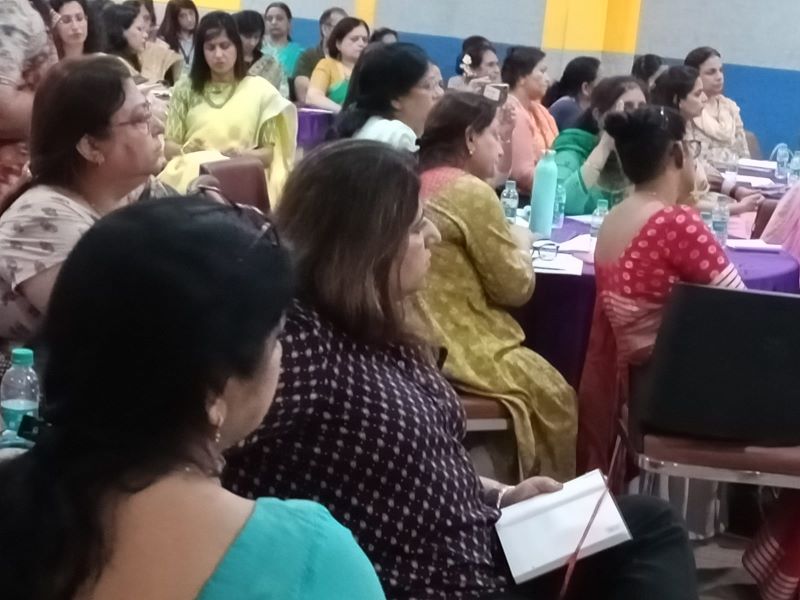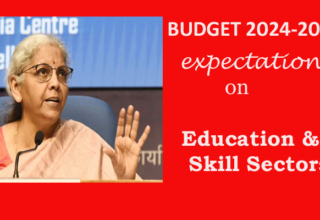
“Education is a key component of a child’s development. The relationships that teachers have with their students and the experiences they provide for them directly shape the neural circuitry of the next generation. Teachers in this way can be seen as neuro-sculptors of our future.”
– JoAnn Deak
Anita Karwal (IAS), the former Secretary, Department of School Education and Literacy and one of the most influential voices on school education in India who helmed important policy reforms in her tenure, says the mindset of school teachers and their upskilling will greatly determine if India indeed reaps the demographic dividend in the next 2-3 decades as its working population peaks and thus, offers the country once in a lifetime opportunity to achieve economic prosperity.
Delivering a keynote at the inaugural session of the 3-day Mentoring the Mentors Program organized by CBSE Sankalp Sahodaya at ITL Public School, Dwarka (New Delhi) in commemoration of 3 years of NEP – 2020 & celebrating India’s G20 Presidency by empowering Education leaders on June 26, the former secretary dwelt upon 11 areas, the understanding of which she viewed as critical for the success of teachers in this transformational era. These areas spanned from Whole Child – Holistic education, Future Skills, Competency Based Learning, Competency-Based Assessment, Language of Instruction, Contextualisation, Inclusion and Diversity, Foundational Learning, Integrate Technology, Student Agency (How To Learn, How To Think, How To Know), Teacher Agency (Autonomy In Pedagogy, Autonomy In Formative Assessment), Involve Parents, to Engage with Families/Community.
She illustrated the significance of these areas by quoting from various studies and published data. Karwal emphasized that the end role education is wellbeing of the student in life. Using analysis from Mental Health Survey 2022 by NCERT on 3,79,842 students countrywide, she flagged the priority issue before the teachers. The concerning trend observed across stages, gender and school types was that students experience anxiety among with regard to studies, examination and results. They report lack of concentration as the major reason for lagging behind in studies in addition to complying to peer pressure most of the times and hesitate in asking questions.
She also showed how NAS 2017 and NAS 21 clearly show that achievement levels are going down and declining proficiency levels in Language and Maths are alarming at class 8 and beyond. Why are both students as well teachers losing interest?
Underlying the significance of the Government to go in mission mode on Foundational Learning and Numeracy (FLN), she brought in the concepts of neuroplasticity. Every child’s brain goes through a spurt phase of learning & a plateau phase of consolidation. “These phases continue almost till we are 40. These are windows of neuro-opportunity – many of them fall in the magic decade – 0 to 10 years & in adolescence. Different parts of the brain are very stretchy during different periods of time – and using it during this period is critical. Teachers are the builders of this phase – what happens during this period lasts a lifetime. Girls are born with better language ability & boys with better spatial ability. Need to work on language with boys & spatial with girls. New research – a part of the brain called ACC – Anterior Cingulate Cortex – that only gets activated when you make a mistake – enhances brain growth & memory,” she added.
Listing Forbes skill sets for the next decade as–Digital literacy, Data literacy, Critical thinking, Creativity, Flexibility, Emotional intelligence, Leadership skills, Collaboration, Time management, Curiosity and Continuous learning, she she cautioned the teachers that greatest disruptions are yet to arrive and they better upskill and remain engaged in integrating technology in their professional life. “Emerging skill requirements suggest a need for education aimed at training younger generations in “flexible self-skilling”, in contrast to specific skilling, she noted.
Talking about the state and status of school education in the country, Karwal, explained how a mean years of just 6.7 years of schooling is contributing to India’s dismal 132 rank in HDI (2022) as more than 1/3rd children aged 16-17 are not attending school even though enrolment at entry level has vastly improved. She further showed how economic growth of India is positively related to the starting level of average years of schooling of males and females at the tertiary level of education. Quoting Eric Hanushek, economist & senior fellow at the Hoover Institution of Stanford University, who has famously said ‘deficiencies in our education systems have an effect equivalent to a major economic recession, & this effect is permanent, former education secretary, emphasized the importance of more school years so that more people enter higher education, which is the main causal force in the economic growth in India.
She also called upon schools to enroll Children with Special Needs (CWSN) in their schools as there is a sharp decline is seen in their enrolment and a significant population of these people is outside the school system of the country.
She also commended the states of Punjab and Madhya Pradesh for changing school education on ground.











